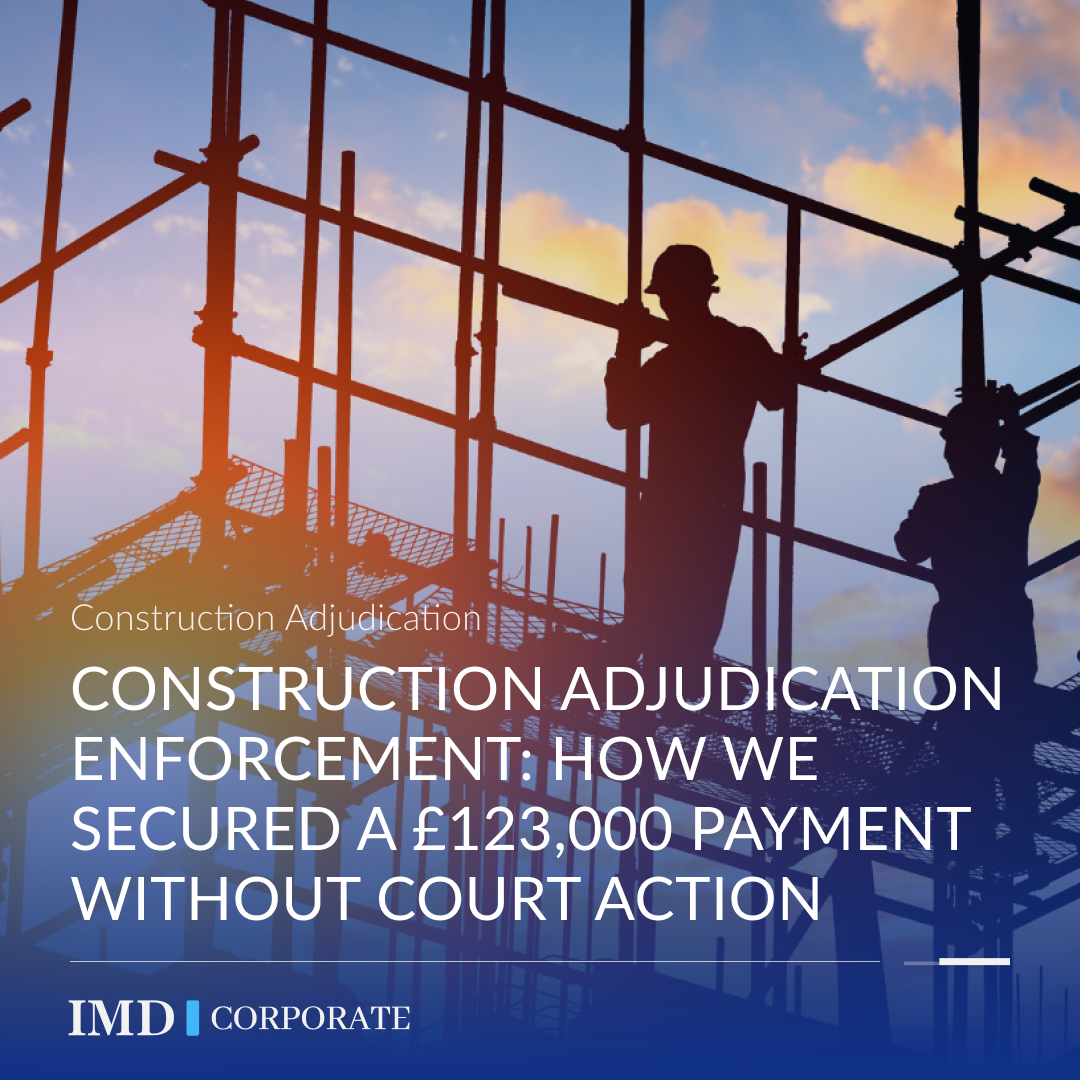Construction Adjudication Enforcement: How We Secured a £123,000 Payment Without Court Action

Get in touch with our resolution solicitors in the UK and call us on 0330 107 0106 to arrange a free no-obligation call or request a free quote.
IMD Corporate was instructed by a contractor who had recently obtained a favourable adjudicator’s decision in their dispute with an Employer under a construction contract. The adjudicator awarded our client approximately £123,000 following a dispute over the Final Account. Despite the clear award, the Employer failed to comply with the decision. What initially appeared to be a straightforward enforcement matter soon revealed significant complications when a “Full and Final Settlement” document surfaced—one which the client had signed post-decision, without legal advice.
This is frequent issue post adjudication, parties inadvertently undermining their legal position by sending or signing documents which may affirm or waive the decision. The case also shows the practical impact of strategic legal correspondence, avoiding the need for court proceedings or insolvency action.
Background and Initial Instruction
Our client, a subcontractor, had referred a Final Account dispute to adjudication pursuant to a JCT contract. The adjudicator awarded a sum of approximately £123,000 in the contractor’s favour. However, the Employer failed to make payment within the required period.
IMD Corporate was instructed to advise on enforcement options. Ordinarily, enforcing an adjudicator’s decision through the Technology and Construction Court (TCC) is a routine matter. On initial review, a potentially complicating factor emerged: the Employer had sent the client a post-decision document, presented as a final account closing statement, which had been signed without legal advice. The document purported to record a “Full and Final Settlement” of all sums due.
Legal Analysis: Was the Adjudicator’s Award Compromised?
The key legal issue was whether this signed document constituted a binding compromise that extinguished the adjudicator’s award.
Nature of the Document
The document was not drafted by lawyers and lacked the clarity usually found in formal settlement agreements. The language used was ambiguous, with no express waiver of the adjudicator’s decision, nor any recitals explaining its intent. It was unclear whether this was simply a “Final Statement” for JCT purposes under clause 4.12, or a contractual settlement overriding the earlier decision.
This ambiguity created a risk that the Employer might argue that the contractor had accepted the adjudicated amount as part of a broader settlement, effectively nullifying the right to enforce. This raised two possibilities:
- Compromise Argument: If the document constituted a contractual settlement, the adjudicator’s decision might no longer be enforceable.
- Confirmation of Final Account: Alternatively, if the document merely recorded the agreed sum as the Final Account value (as already determined by the adjudicator), the adjudicator’s award would remain enforceable under the Housing Grants, Construction and Regeneration Act 1996.
We determined that the Employer’s document did not contain the necessary elements of a concluded compromise, and in any case, lacked the legal certainty required to defeat the statutory right to enforce an adjudicator’s award.
Enforcement Strategy: TCC or Insolvency Route?
With the risk of compromise deemed low, we turned to enforcement options:
- Court Enforcement: Issuing Part 7 proceedings in the TCC for summary judgment.
- Statutory Demand/Winding-Up Petition: Based on the adjudicated sum as an undisputed debt.
The winding-up route carries commercial and reputational risks and is not appropriate where there is a credible dispute. However, a party may rely on an unpaid adjudicator’s award to support a statutory demand in the absence of genuine dispute.
That said, before pursuing either route, we issued a formal letter before action, setting out the client’s intention to enforce the award by all available means. The letter included legal analysis, reference to the S&T (UK) Ltd v Grove Developments Ltd [2018] decision on the binding nature of adjudicator’s awards, and a demand for immediate payment.
Outcome and Practical Insights
Within days of receiving our correspondence, the Employer paid the adjudicated sum in full. No court proceedings or insolvency action was necessary.
While the successful outcome was welcome, the matter serves as a cautionary tale. Signing ambiguous documents without legal advice, particularly after a formal adjudication, risks undermining otherwise straightforward enforcement.
Key Takeaways for Contractors and Employers
- Legal Advice Before Signing Post-Adjudication Documents
Parties should not sign any document purporting to resolve or “close” a final account post-adjudication without legal review. Even informal or non-legally worded correspondence can amount to a binding contract under the doctrine of accord and satisfaction. - Adjudicator’s Awards Are Enforceable
Adjudication is a powerful tool to secure payment in construction disputes. The courts maintain a firm approach to enforcement, particularly where there is no credible dispute or settlement. - Do Not Ignore Payment Obligations
Employers who attempt to avoid payment by silence or delay may face swift legal action. In this case, the mere threat of enforcement, combined with robust legal correspondence, resulted in payment being made without court involvement. - Court Enforcement vs Insolvency
Enforcement of adjudication decisions can proceed either through the courts or insolvency mechanisms. Each route must be assessed carefully for strategic and commercial implications. - Document Ambiguity Creates Uncertainty
Poorly drafted or unclear documents can increase legal costs and create unnecessary risk. Legal input at an early stage is often more cost-effective than resolving disputes later.
Conclusion
This is a case of strategic approach to construction disputes, focusing on practical outcomes and efficient resolution. Our firm’s commercial litigation team continues to support contractors and subcontractors in enforcing payment rights, particularly in the face of delayed or disputed Final Account settlements.
For legal advice regarding adjudication, enforcement, or construction contract disputes, contact the commercial litigation team at IMD Corporate.
This article is for general information only and does not constitute legal or professional advice. Please note that the law may have changed since this article was published.


















